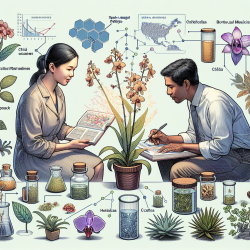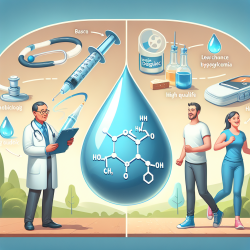Introduction
In the ever-evolving field of speech-language pathology, practitioners are constantly seeking innovative ways to enhance therapeutic outcomes, particularly for children. A recent study titled "A U.S. Pharmacopeia (USP) overview of Pan American botanicals used in dietary supplements and herbal medicines" offers a compelling insight into the potential applications of botanicals in therapeutic settings. This research underscores the importance of quality standards in botanical ingredients, which can significantly impact the safety and efficacy of herbal medicines used in various healthcare practices.
Key Findings and Implications
The research highlights the critical role of quality control standards in ensuring the safety and efficacy of botanical ingredients used in dietary supplements and herbal medicines. It emphasizes the need for public quality standards to reduce the flow of substandard and adulterated products, thus ensuring public health and safety. This is particularly relevant in speech-language pathology, where the use of safe and effective therapeutic agents is paramount.
For practitioners, integrating botanical research into therapy can offer new avenues for treatment, especially for children with speech and language disorders. The study provides a comprehensive overview of the regulatory status of herbal products across different Pan American regions, highlighting the development of national quality and research initiatives.
Practical Applications for Practitioners
- Incorporating Herbal Medicines: Practitioners can explore the use of safe, standardized herbal medicines as complementary therapies in speech-language pathology. This can be particularly beneficial in managing symptoms such as anxiety, which often accompany speech disorders.
- Ensuring Quality and Safety: By adhering to USP standards, practitioners can ensure that the botanical products used in therapy are of high quality, reducing the risk of adverse effects and enhancing therapeutic outcomes.
- Further Research: Encouraging further research into the applications of botanicals in speech-language therapy can lead to innovative treatment approaches and improved outcomes for children.
Conclusion
The integration of botanical research into speech-language pathology offers promising opportunities for enhancing therapeutic outcomes. By focusing on quality and safety, practitioners can leverage the benefits of herbal medicines to support children's speech and language development effectively. As the field continues to evolve, ongoing research and adherence to quality standards will be crucial in realizing the full potential of botanicals in therapy.
To read the original research paper, please follow this link: A U.S. Pharmacopeia (USP) overview of Pan American botanicals used in dietary supplements and herbal medicines.










